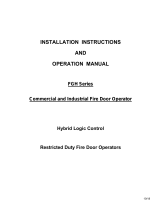www.milleredge.com info@milleredge.com 800-220-3343 2/4
1. Mount the emitter and receiver vertically or
horizontally in their desired locations.
a) Install the emitter and receiver into their brackets.
(Image 1)
i. Place provided nuts into the top and bottom
recessed corners of the photo eyes. (A)
ii. Slide the photo eyes into their brackets. (B)
iii. Place washers onto screws and insert
through bracket and emitter and receiver from
the side opposite the nuts. Finger tighten to
secure in place. (C)
b) Using the appropriate hardware required by the
mounting surface, attach the mounting bracket. The
emitter lens will point across the protected area
toward the receiver mounting location. (Image 2)
2. Power the emitter and receiver. To avoid risk of
electrocution, turn off and disconnect power to the
operator before wiring.
a) Connect the emitter and receiver to the operator per
the wiring diagram. (Figure 1)
b) Apply power to the operator.
c) Confirm the green LED lights on the emitter and
receiver has turned on. (Figure 2)
3. Align the receiver with the emitter. (Image 2)
a) Aim the emitter toward the receiver. You can stand
or kneel beside the unit, sighting along it and
viewing the yellow receiver LED, to help with
alignment. (Image 4)
b) With the hardware loosened, turn the emitter and
receiver left and right and/or up and down until the
yellow receiver LED turns on solid. (Image 3)
c) Tighten the mounting screws. Do not overtighten
the through-unit screws.






